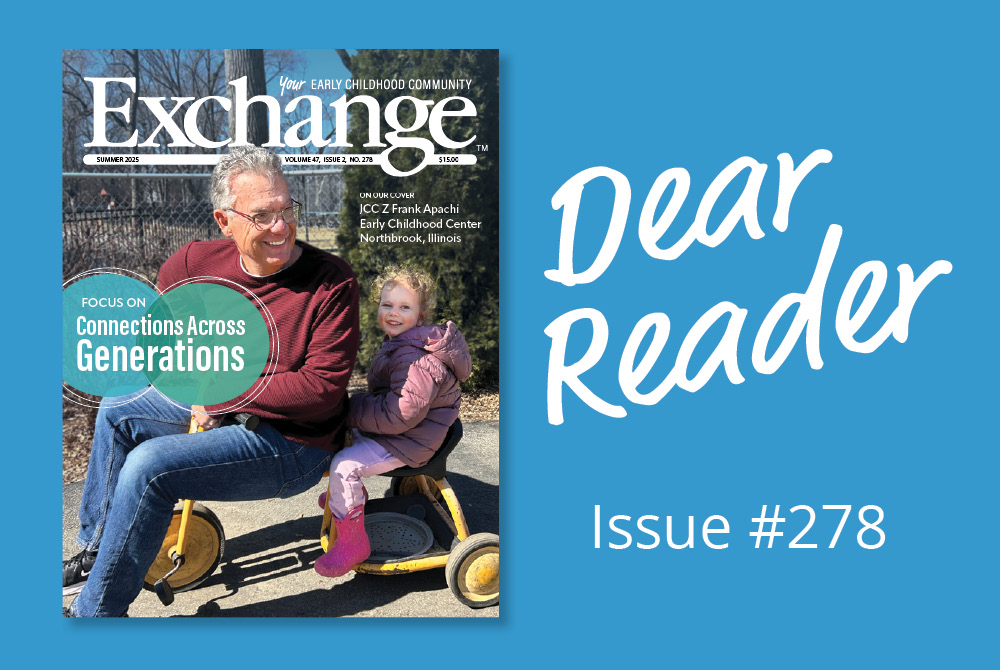I am not going to sugar coat it. This was not an easy issue of Exchange to put together. At every turn, we encountered an obstacle. The specter of COVID-19 hovered over our production phase, affecting potential authors and others involved in making the magazine. We scrambled, we apologized, and we came together as a team to get it across the finish line. (And we think it is a pretty great issue, to boot!)
We hear that you, our readers and colleagues, are struggling, too. You are moving mountains on a daily basis. We see it in your weary eyes on Zoom video; we hear the sound of your children arguing in the background of conference calls. We feel your anxiety and exhaustion acutely, and we want you to know that we see you. In fact, following the release of a National Public Radio story on the challenges facing early childhood educators, we used a recent Exchange Every Day message to invite readers to share how they are doing.
“I think it is mostly psychological exhaustion as we directors try to navigate the repercussions of the decisions others make that can have a huge ripple effect on the center. Now it has become our responsibility to educate and become experts on quarantine time periods and the effectiveness or non-effectiveness of at-home tests versus PCR. The stress of trying to find subs, and anxiety over potentially getting sick myself and what that could do to the center. Honestly, my faith is what has gotten me through, and working in a faith-based center.” –Anne Mari Buchanan
“My preschool is in its first year. My thoughts are with everyone in the field. I am a small business; it must be extremely difficult for a large center.” –Cheryl Tella
To honor ourselves and our lived experiences, we have to acknowledge them. Failing to do so can lead to toxic positivity. So, for any of you who need to hear this: now and then, it is entirely fair to wallow. Weep. Rage. Worry. Ideally, we bring our friends and loved ones and trusted colleagues along with us, at least some of the time. Facing down these challenges does not make us weak or “too emotional.” There is comfort in talking about hard things, and an inherent embracing in these conversations of soul-honesty.
There is another place to put this pain. Action is the antidote to despair, and in coming together, we can find shared purpose and avenues for easing our individual burdens. Take it from some of your peers:
“During the pandemic, our early education program has learned to pivot multiple times. We have adjusted to varying masking rules and learned to be a flexible staff. Our team works cooperatively to make sure children and their families are put first, but at the same time recognizes staff and their potential work stress. It might be as simple as our staff cheering on our Kansas City Chiefs or sharing growth we have observed in the classroom, but overall we are working together.” –Diana Kimbrough
Exchange Every Day commenter Andrea added, “Even though this has devastated the field in general, our teachers and some families are learning to really be there for each other and check on each other, which gives me hope that we will come through this stronger, and have even better relationships in the future.”
And finally, this short and sweet message posted by Alyssa Dituro brought a big smile to my face: “We can do this! We are needed and resilient!” Sometimes, we all just need to find our own personal cheerleader.
As my psychologist friend likes to tease me, “Feel your feelings.” Do not turn away from discomfort, but likewise do not let it control your narrative. A line from a Greek poem has, across time, been quoted by activists in many movements: “They tried to bury us; they did not know we were seeds.”
It is muddy right now. Let the rain wash over you. Wriggle around until you can glimpse the sun. Let it warm your skin. Then let your magic bloom.
Sara Gilliam author and former editor of Exchange magazine.
Related
ADVERTISEMENT










